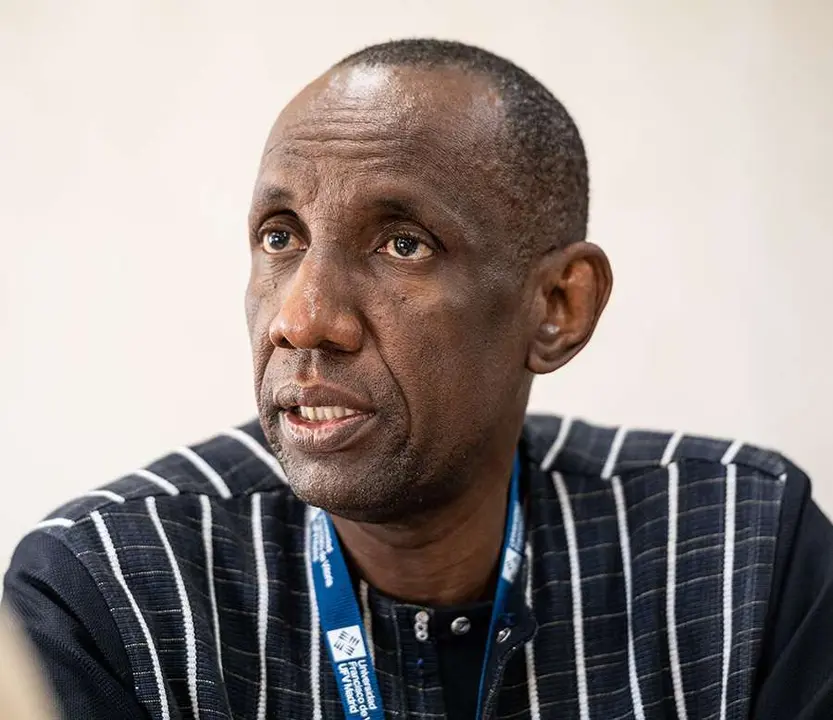Boubacar Ba: "Russia wants to establish itself in the Sahel by discrediting France"

Boubacar Ba, researcher and director of the Centre for Analysis on Governance and Security in the Sahel, discusses the current political situation in Mali, France's withdrawal and Russia's role in the Sahel. The Bamako-based expert works in Mali, Niger, Burkina Faso, Mauritania and Chad.
To talk about the political transition in Mali, one must first recall the stages.
The first stage was the coup d'état in 2020 that led to the fall of the old regime after numerous demonstrations in Bamako's Independence Square. The Malian people took to the streets en masse because they were fed up with the regime, corruption, insecurity and the economic crisis.
Then came the coup d'état. Military officers joined the citizens' protests because they also wanted a political transition. But unfortunately, 9 months later, after May 2020, in August 2021, there was a second coup d'état.
It is after the second coup that the transitional government announced at the UN General Assembly that France was leaving Mali. This made us think that France has never respected its commitments.
In this context, Russia, which had maintained relations with Mali since the country's independence until the fall of the Soviet Union, when relations cooled, appears. In recent years, however, these ties have re-emerged. Starting in December 2021, the Malian government organised national meetings to define reforms and then launched a very strong military offensive with Russian assistance, with operations stretching from the south of the country towards the Burkina Faso border.

Yes, the problem with ECOWAS was related to the electoral process, which could not be implemented. I think these sanctions were terrible from an economic point of view, they worsened living conditions. Even so, the government resisted for six months by defining strategies on the borders of Mauritania and Guinea to strengthen security. However, there was social unrest due to the difficult economic situation. As a result, Mali began negotiations with countries. Some tried to make it understood that a country in transition with such a situation could not be abandoned. Some nations like Togo were willing to negotiate, but there were also groups in ECOWAS that wanted tough sanctions.
The sanctions were finally lifted on 4 July, ECOWAS agreed to a 24-month period to prepare for elections. And there will also be reforms. That is the big question, is it up to a political transition to make reforms? Some think not, others think yes. In Mali, since 1992, there have been several attempts to change the constitution, but so far they have not been successful.
The security issue must also be addressed and all these disputes related to France, Barkhane, and the arrival of the Russians must be avoided. But I think reforms should focus on the elections in 2024.

No, we cannot say it was a failure because the operation was launched at Mali's request. France arrived first with Serval and helped to expel the terrorist groups, but unfortunately there were also difficulties.
For example, France's action, from Serval to Barkhane, is seen by the Malian government as a solitary process without any real consultation with Bamako. Even so, France has provided security advice to the Malian authorities in the area of training.
Moreover, the EU does not want to work with paramilitary forces, so Mali will lose geostrategic positions. It has already been seen that, since France began to leave, the central government has become the target of terrorist groups such as Daesh.

Yes, Europe and NATO should be involved, but they should also take into account the sovereignty of states. NATO's or France's mandates should not be too long, as they could be criticised and these countries could be accused of neo-colonialism, of wanting to try new strategies to reoccupy the Sahel countries. This is why a clear framework for cooperation must be defined, and above all a phased withdrawal must be defined so that there is no confusion.

Russia supports countries in crisis - as it does in Syria - that need international support or where NATO could not succeed. There are several examples in Africa, such as Libya, Mali or the Central African Republic. I think Russia wants to establish itself in the Sahel by discrediting France. Moscow shows that France does not have the capacity to control the Sahel countries.
On the other hand, Russia has the capacity to inform, to use social networks to convince and of course it is able to fight armed groups. There are successes, but also failures. Russia wants to increase its influence in the region to regain the space it has lost since the fall of the Soviet Union in 1990.








